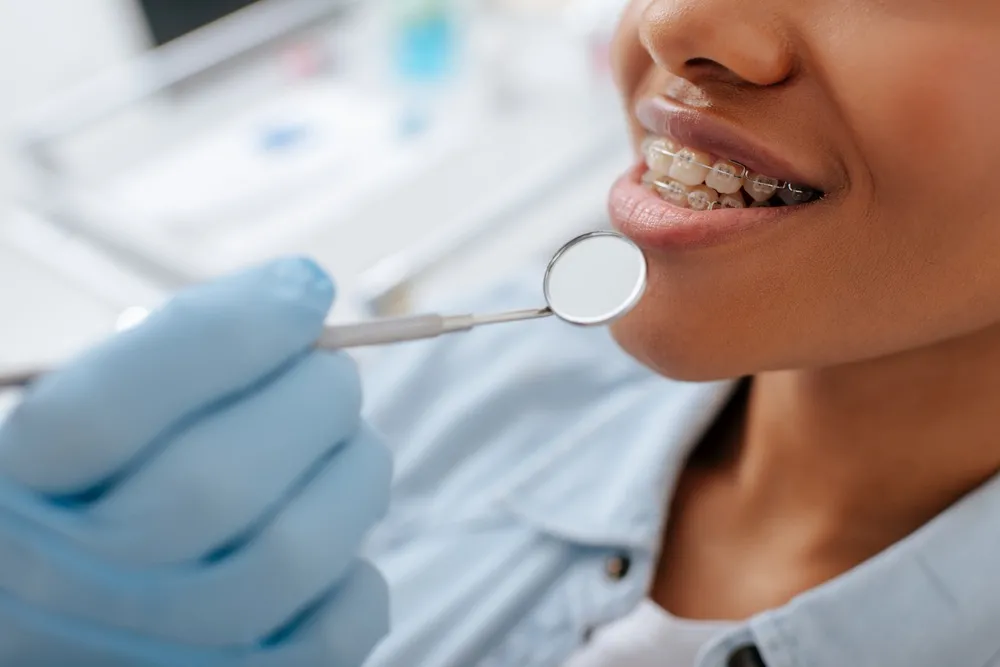Jaw pain, clicking sounds, or difficulty chewing may seem like minor annoyances, but for many people, they are signs of a larger condition known as a TMJ disorder. The temporomandibular joint (TMJ) connects your jaw to your skull, and when something goes wrong with this joint, it can cause chronic pain and affect your quality of life.
Fortunately, orthodontists are often a key part of diagnosing and treating TMJ disorders. If you’re in Westwood, MA, and dealing with jaw discomfort, here’s what you should know about TMJ disorders and how orthodontic treatment can help.
What Is the TMJ?
The temporomandibular joint (TMJ) is a hinge-like joint that connects your lower jaw (mandible) to your skull. It allows you to open and close your mouth, chew, and speak. The TMJ is supported by muscles, ligaments, and cartilage that keep it moving smoothly.
When the joint doesn’t function properly, it’s referred to as a TMJ disorder or TMD.
Symptoms of a TMJ Disorder
TMJ disorders can cause a wide range of symptoms, including:
- Jaw pain or tenderness — Especially when chewing or talking
- Clicking, popping, or grinding noises in the jaw joint
- Limited ability to open or close the mouth
- Headaches or migraines — Often linked to jaw tension
- Ear pain or ringing — Sometimes mistaken for an ear infection
- Facial pain — Especially around the cheeks or temples
- Neck or shoulder discomfort — Caused by jaw misalignment or muscle strain
Because these symptoms overlap with other conditions, TMJ disorders can be difficult to diagnose without a professional evaluation.
Common Causes of TMJ Disorders
Several factors can contribute to TMJ problems, such as:
- Bite misalignment — When teeth don’t fit together properly, added stress is placed on the jaw joint.
- Teeth grinding (bruxism) — Excessive clenching or grinding wears down teeth and strains the TMJ.
- Jaw injury — Trauma from accidents or sports injuries can damage the joint.
- Arthritis — Degenerative conditions may affect the joint’s cartilage.
- Stress — Emotional stress often leads to unconscious clenching of the jaw muscles.
Orthodontists often play a role in treatment because many TMJ issues are related to bite alignment.
How Orthodontists Diagnose TMJ Disorders
Orthodontists in Westwood begin with a thorough evaluation that may include:
- Reviewing your symptoms and medical history
- Examining your bite and jaw movement
- Checking for clicking or popping sounds in the joint
- Taking digital scans or X-rays to assess the jaw structure
This comprehensive approach helps rule out other causes of pain and ensures an accurate diagnosis.
Orthodontic Treatments for TMJ Disorders
Orthodontists have several strategies for managing TMJ disorders, depending on the severity and underlying cause. Treatments may include:
- Bite correction with braces or aligners — Improving alignment to reduce strain on the jaw joint
- Splints or nightguards — Custom devices to prevent teeth grinding and relieve jaw tension
- Jaw repositioning appliances — Helping the jaw move into a healthier position
- Retainers — Maintaining proper alignment after treatment to prevent recurrence
By addressing the root cause of misalignment, orthodontic care can provide long-term relief from TMJ symptoms.
Non-Orthodontic Approaches That May Help
In addition to orthodontic care, other treatments may be recommended:
- Physical therapy — Exercises to strengthen jaw muscles and improve function
- Stress management techniques — Reducing clenching and grinding linked to stress
- Medications — Such as anti-inflammatories or muscle relaxants for temporary relief
- Lifestyle adjustments — Avoiding hard or chewy foods, practicing good posture, and limiting gum chewing
A multi-disciplinary approach often provides the best results.
When to See an Orthodontist for TMJ Symptoms
You should consider scheduling a consultation if you experience:
- Frequent jaw pain or headaches
- Clicking or popping sounds that cause discomfort
- Difficulty opening or closing your mouth fully
- Teeth that feel uneven when you bite down
- Chronic grinding or clenching habits
Early intervention can prevent TMJ disorders from worsening and protect your long-term oral health.
Living with TMJ Disorders
TMJ disorders can be frustrating, but they don’t have to control your life. With the right diagnosis and treatment, most patients experience significant relief. Orthodontists in Westwood can play a key role in restoring comfort, function, and confidence.
The Bottom Line
TMJ disorders affect more than just the jaw—they can cause headaches, facial pain, and difficulty eating or speaking. Because many cases are linked to bite alignment, orthodontists are uniquely qualified to help.
If you’re struggling with TMJ symptoms in Westwood, MA, ARCH Orthodontics offers expert consultations and treatment options to relieve discomfort and improve jaw health. Schedule your free consultation today and take the first step toward lasting relief.

